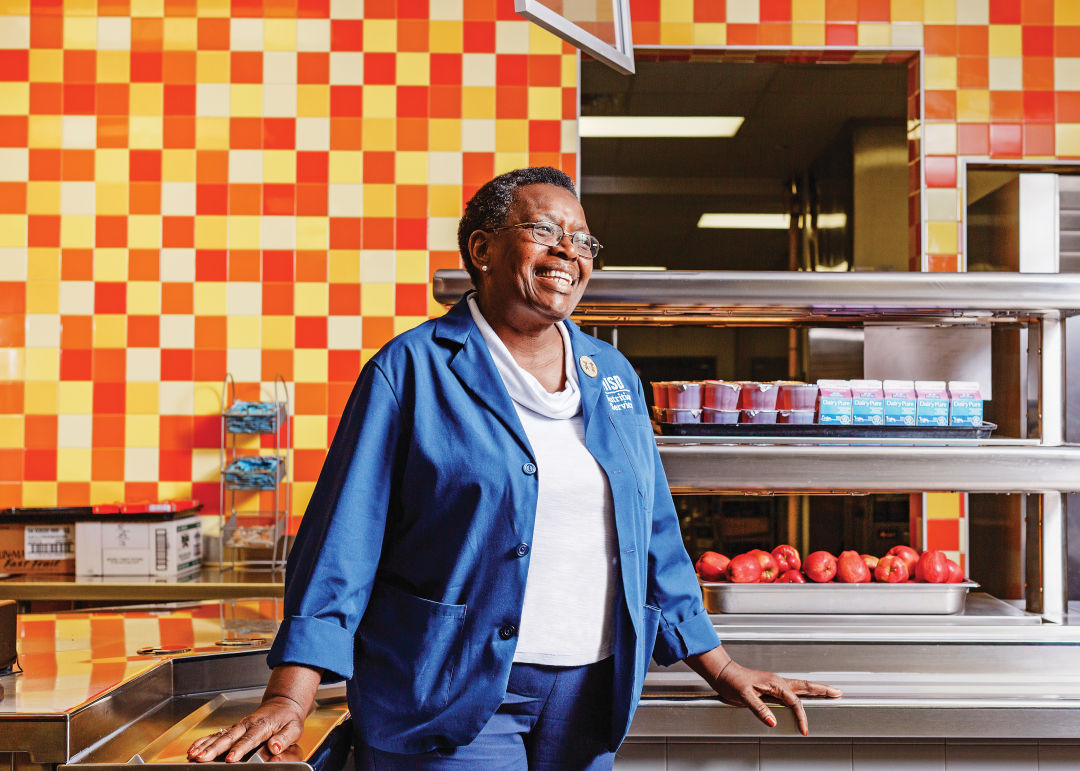The Woman Who Reinvented Healthy School Meals in Detroit Is Ready to Do the Same for Houston

Image: Max Burkhalter
Ask Betti Wiggins what makes her excited about Houston, and she quickly mentions the 10-month growing season. “It’s a whole new world,” she says, animated by the thought. Wiggins, the new nutrition officer for HISD, grew up on a farm in Southern Michigan, where the growing season is a mere six months. As a child, she lived on a church farm, where she helped to raise the vegetables and chicken that families enjoyed every Sunday at church.
The experience gave her a unique perspective on food that has made her a pioneer in her field over a career spanning nearly a half-century. In May, she accepted the Silver Plate Award from the International Foodservice Manufacturers Association, beat out for the gold by none other than Wolfgang Puck. And that’s just one of three major awards Wiggins—dubbed the Rebel Lunch Lady—received in the last year for her transformation of Detroit Public Schools’ child nutrition program. Now that she’s been recruited to Houston, she’s ready to shake up the way our students eat, too.
It was during her college years in the 1970s at Detroit’s Wayne State University that Wiggins first became interested in nutrition, inspired by the work of the Black Panther Party, which in that era was opening storefronts offering free breakfast for neighborhood kids in Oakland. Soon, she changed her major to dietetics.
While an undergrad, Wiggins did research for a major data-collection project that spurred the creation of federal school-breakfast and senior-meal programs. She eventually became both the first African American and the first woman in a management role in Marriott’s former school-services division, before switching to work in-house for school districts in cities across the country, including Ann Arbor, Baltimore and Washington, D.C.
After returning to her hometown in 2006 and going to work for Detroit Public Schools, Wiggins helped the district to bring nutrition management in-house, severing a contract with Aramark, as Houston did last year. Then, spurred by a 2009 report on Detroit’s high rate of childhood obesity, she started spending more money on quality ingredients, partnering with local farmers to buy and serve fresh produce like jicama and snap peas. Out went chocolate milk and hot dogs—what Wiggins calls “carnival food”—replaced by foods that reflect the diversity of the students, like hummus and curried rice.
A partner effort she founded, the Detroit School Garden Collaborative, now has 80 school gardens, all run by students, who learn everything from nutrition and agricultural principles to math and business skills from selling the crops at local farmers markets.
“They don’t teach home economics anymore, so young men and women don’t know how to prepare a meal, don’t know how to cook a vegetable, don’t even know how to boil a pot of beans. So we try to provide those services, to expose kids,” says Wiggins. “I’m trying to change the attitude, trying to teach kids they can have good, local food, they can grow food, they can change their food habits.”
Today, Wiggins advocates for targeting the larger community—rather than just those who qualify for food subsidies—in the fight against childhood hunger. It’s a major concern for her now in Harris County, which she was surprised to learn has one of the highest rates of food insecurity in the country.
“What we all have to realize is that a hungry child cannot learn. And that hungry child is not necessarily poor,” says Wiggins. “My other crusade is about the kid at the end of the cul-de-sac. In some cases that kid is just as needy as the kid whose parents don’t have money. When you look at all this lunch shaming and bad debt, it’s not the poor kid, because the poor kid already has free or reduced lunch. It’s the kid whose parent has come up short, and it’s Wednesday, and the money doesn’t come until Friday, or the payment on the mortgage is due.”
Wiggins says her mandate for HISD is to launch the kinds of programs she spearheaded in Detroit. Already in the process of partnering with local farms, she’s also hoping to make use of Houston’s reputation as a culinary capital by collaborating with local chefs to put their own signature dishes on district menus.
And she’s intent on applying business principles to maximize HISD’s nutrition assets, including a 220,000-square-foot, state-of-the-art commissary that centralizes food production for the district’s 250,000 students. Why, she asks, isn’t the district feeding pre-K and kindergarten students—merely because it’s not required? Why not prepare food for organizations like Meals on Wheels when school is out of session, and sink the profits into providing better options for the kids?
“There’s so much we can do beyond the school day to serve the community that we live in using our know-how and these economies of scale. Do you know how many educated, technically skilled people we have working in this child-nutrition program? And all we want to do is confine them to 175 days a year, breakfast and lunch,” says Wiggins. “We have to be engaged. If we don’t give support to the community, I don’t care what I sit back here and do, it’s not going to work.”
When the school year begins later this month, Wiggins won’t just be working on HISD gardens or managing the production menu. She likes hanging out in the cafeteria, addressing each of her young customers as sir and ma’am while working the lunch line.
“I get immediate results. I don’t have to wait five years for a test score,” says Wiggins. “When a kid says ‘That was good, can I have some more?’ That’s what I’m looking for.”




